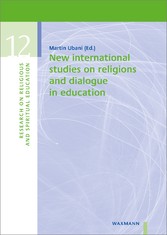Suchen und Finden
Service
Book Cover
1
Impressum
4
Contents
5
Editorial
7
Raising a Christian or an Orthodox Christian? Parents' experience of their ecumenical reality and minority status in the religious upbringing of Finnish Orthodox children and youth (Pekka Metso)
13
Abstract
13
The "ecumenical family" as a challenge for religious upbringings
13
Interplay between the domains in religious socialization
16
Ideals and the reality of religious socialization in the Finnish context
17
Analysis
18
Conclusions
26
References
28
Theoretical and methodological perspectives to studying religious and cultural diversity in Finnish, Swedish and Estonian comprehensive schools (Arniika Kuusisto, Jörgen Straarup, Olga Schihalejev, Arto Kallioniemi & Linda Vikdahl)
31
Abstract
31
Introduction
31
Method
36
Conclusions
41
References
42
Interreligious education in Catholic schools in Hong Kong. Promoting human values in risk of assimilation by sovereign transition (Imelda Pui-hing Lam)
47
Abstract
47
New era in Hong Kong
47
Salient features of the new curriculum on religious education
49
First distinguishing feature: core human values
50
Second distinguishing feature: Interreligious education regarding Christianity and Confucianism
53
Third distinguishing feature: Approach of Emmaus Pedagogy
56
Conclusion
58
References
59
The role of mindful art-making in Jewish dialogical spiritual education (Elyssa Wortzman)
61
Abstract
61
The role of mindful art-making in Jewish dialogical spiritual education
61
How do students perceive learning through MABJSD?
67
Concluding remarks on an art-based spiritual tool-box for dialogic learning
74
References
76
Toward democratic practices in RE? A teaching experiment in Finnish classrooms (Martin Ubani)
81
Abstract
81
Introduction
81
RE classroom practices and participation
82
Research procedures
85
Results
86
Concluding Remarks
89
References
91
Appendix 1. Statistics on the variables
94
Theology students' views about competence on multicultural and multi-faith issues (Mehmet ?anver & Özgür Erakku?)
95
Abstract
95
Religious education in multicultural and multi-faith environments
95
Method
101
Findings
103
Discussion
108
References
109
Church and state in educational dialogue. A historical study of the presbyterian church of Ghana (Seth Asare-Danso)
111
Abstract
111
Introduction
111
Conceptual and theoretical frameworks
112
Methodology
113
Research Questions
113
Data analysis
114
Concluding remarks
122
Recommendations
123
References
124
Appendix 1
126
Early childhood educational thinking in a Christian day-care centre (Hilkka Luttinen & Ulla Härkönen)
129
Abstract
129
Introduction
129
Theoretical background
130
Research question
133
Methods
134
Results
134
Conclusions
136
References
138
Religious minorities as bridge builders in diverse classrooms (Aina Hammer & Nanna Paaske)
141
Abstract
141
Introduction
141
Background and theoretical framework
143
Method
144
Results
147
Narratives and counter narratives
149
Identity and affiliations
151
Discussion
151
Conclusion
153
References
154
Islamic education in the non-confessional frame. Challenges of Islamic religious education in the Finnish context (Saila Kujanpää)
157
Abstract
157
Introduction
157
Defining the context: the framework of RE in Finland
159
Development of IRE in the Finnish context
161
Challenges of IRE in the Finnish context: Who defines Islamic education?
164
Concluding remarks
166
References
168
What kind of educational reflections do RE student teachers have during their pedagogical studies? A dialogical perspective on a case study (Martin Ubani)
173
Abstract
173
1. Introduction
173
Teacher's professional reflection and Finnish RE teacher education
174
Research procedures
175
Results
176
Susan's reflections during the year of her pedagogical studies
178
Concluding remarks: Meeting the dialogical aspect in teacher's reflection
183
References
184
Religious competence and the new national curriculum of Latvia. Current developments (Laima Geikina)
189
Abstract
189
Introduction
189
Theoretical framework of the National Curriculum: constructivist and social constructivist approach
192
What is the place for RE and Ethics in this challenging NC?
194
Crossing the subject borders or dialogue between different subject traditions
196
Discussion
197
References
198
High school students' views on the use of digital learning objects in religious education (Vasiliki Mitropoulou & Smaragda Faridou)
201
Abstract
201
1. Introduction
201
2. The digital material: Pedagogical and teaching approach
203
3. Method
206
4. Results
207
5. Discussion on the findings
214
6. Concluding remarks
216
References
217
A teacher as a user of technological devices and social media applications in religious education (Risto Aikonen)
219
Abstract
219
Background for the research
219
What do we mean by devices and applications?
220
ICT, applications and religious education – still looking for each other?
222
Research methodology
223
How frequently do teachers use devices in RE?
224
How frequently do teachers use social media applications (WEB 2.0) in RE?
227
Does a teacher's background effect the use of devices in RE?
229
Does a teacher's background effect the use of applications (WEB 2.0) in RE?
230
Conclusions
232
References
235
Appendix 1. Teachers' familiarity with the WEB 2.0 applications in education
238
Alle Preise verstehen sich inklusive der gesetzlichen MwSt.








